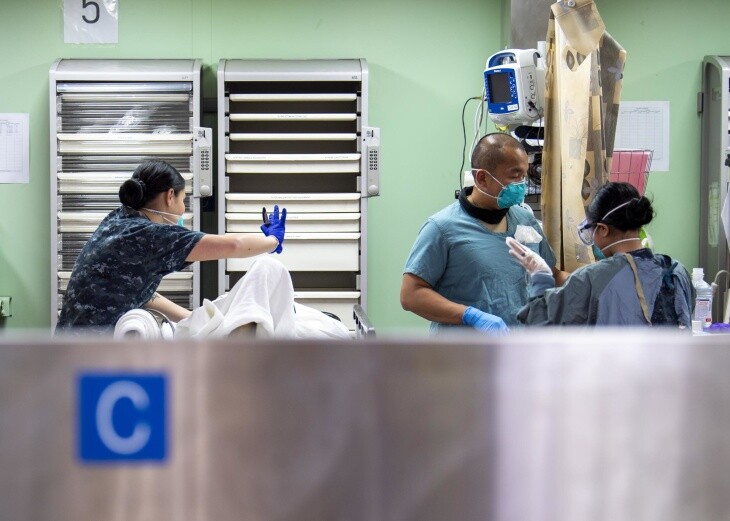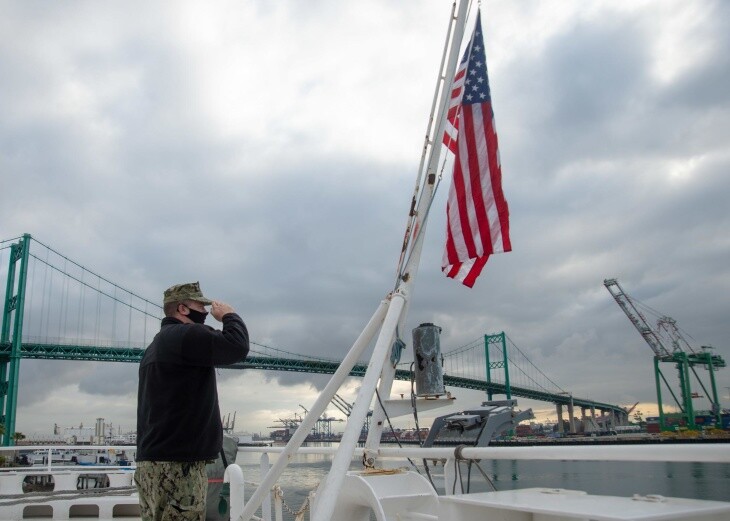The Navy Hospital Ship Mercy Has Few Patients; Now Some Crew Have Coronavirus
The following article was originally published April 16, 2020, and republished through a collaboration with KPCC and LAist.
Story by Emily Elena Dugdale
The Navy hospital ship USNS Mercy came to Los Angeles to treat patients who don't have COVID-19 and to ease the burden on the area's hospitals.
It's treated only a few dozen patients since its arrival. And now it's dealing with a growing number of COVID-19 cases among its crew.
More than a half dozen crew members have tested positive. The Navy said they have been isolated off-ship, as have a larger number of personnel who came in contact with them.
"The ship is following protocols and taking every precaution to ensure the health and safety of all crewmembers and patients on board," the Navy said in a statement. "This will not affect the ability for Mercy to receive patients at this time."
The 1,000 bed former super tanker turned floating hospital pulled into the Port of Los Angeles in late March and was greeted by grateful politicians, including California Governor Gavin Newsom.
"These men and women were quite literally called up a few days ago and came from hospitals all over the state of California and the region," Newsom said, crediting President Donald Trump for approving the ship's itinerary.
Normally the massive ship docks in San Diego, but it moved quickly up the coast.
"We activated the ship within five days of receiving the call," said John Rotruck, the commanding officer of the ship's medical treatment facility.
He said the staff of roughly 900 people includes cooks, lab techs and lots of doctors — from general surgeons to plastic surgeons.
Nearly a dozen hospitals have sent patients to the Mercy since it arrived.
So far, Rotruck says they've treated patients for gunshot wounds, heart failure, and pneumonia.
But the ship isn't staffed to treat everything. There's a long list of procedures the ship can't do. For example, it can't take care of children or perform open heart surgery.

The deployment of the Mercy is open-ended and not restricted to Los Angeles.
Sal Mercogliano is a professor of history at Campbell University and a former merchant mariner.
One of the best things about the ship, according to Mercogliano:
"Their ability to steam at 17-and-a-half knots and all of the sudden leave Los Angeles and be in San Francisco the next day, or Seattle two days from then," he said.
Doctors recently criticized the U.S. Navy ship Comfort, which is docked in New York City, for treating only a small number of patients while hospitals were overloaded with COVID-19 cases.
The ship eventually brought on some of the sickest COVID-19 patients.
But in L.A., John Rotruck said he hasn't yet had a lot of requests for the ship's services. Los Angeles County still has hundreds of ICU beds available.
The Navy said the ship stands ready to pivot to caring for COVID-19 patients, if needed.
"I dearly hope it does not," said Bill Caswell, the Senior Vice President and Chief Operating Officer of Kaiser Permanente Southern California. His hospitals have sent a handful of patients who volunteered to go aboard the Mercy.

He said a switch to only COVID-19 patients on the Mercy would signal the worst-case scenario — that the hospital system can't handle the virus.
But Caswell said the curve is flattening a little in L.A.
"A low trend and fewer patients on the Mercy might be one of those mixed blessings," he said.
Caswell said he's confident it's a safe place for patients, despite the string of positive test results among members of the crew.
Still, Mercogliano said a ship isn't designed to deal with a virus.
"The issue with doing that onboard a hospital ship is fairly significant because hospital ships are basically floating communities," Mercogliano said. "They produce their own water, they produce their own air, they produce everything they need."
This story was produced by the American Homefront Project, a public media collaboration that reports on American military life and veterans. Funding comes from the Corporation for Public Broadcasting.



